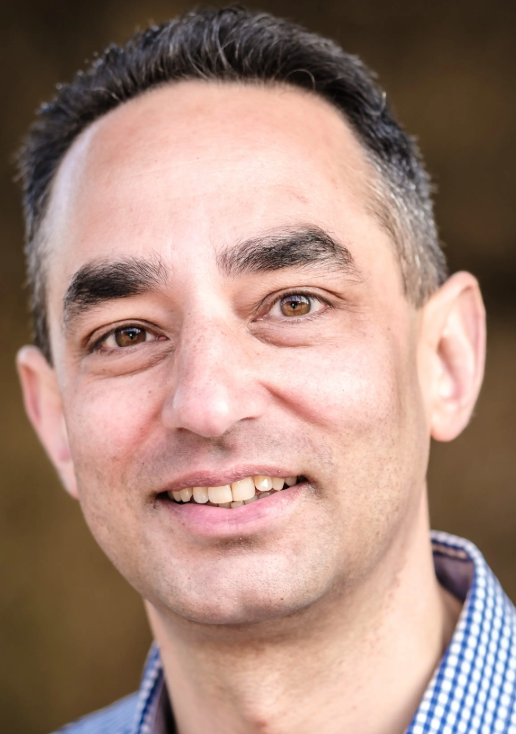Aarun Naik is a counsellor in Liverpool and online
What attracted you to become a therapist?
I went through some difficult times and realised I needed to look at myself. I found my way to counselling and then to group therapy where I began to understand myself, my beliefs, and behaviours. I wanted to continue learning more about myself and that is what initially led me to train. During that process I found myself tremendously inspired by the many amazing therapists with whom I came into contact. I also discovered I loved working with people in a therapy context and realised that was what I wanted to do.
Where did you train?
With Canada's Clearmind International Institute. I studied a three-year diploma in transpersonal counselling psychology. I've undertaken various other training in different modalities and approaches since. I love to keep training and developing.
Can you tell us about the type of therapy you practise?
I use an integrative approach. Always at my core is the person-centred approach, allowing the client to be deeply heard and acknowledged in order to create that essential safety, trust, and rapport. I also incorporate the psychodynamic. Where appropriate, I like to use experiential exercises to support clients to safely connect to their feelings at a deeper level. I believe we can often learn more about ourselves and come to realisations by BEING IN the experience as opposed to simply TALKING ABOUT the experience.
I'm also influenced by Family Systems Theory. This involves exploring client dilemmas in the context of the wider family in which they grew up. We take on beliefs, roles and values and adhere to or break 'family rules' based on events that happen in our family through the generations. This can unconsciously shape who we are and how we behave in the world today.
How does integrative therapy help clients?
One of the benefits of an integrative approach is it allows me to weave a number of different modalities and styles depending on the client in front of me and what I believe may best support them in that moment. However, what I will say here is that I subscribe to the belief that you can have all the modalities, frameworks, and fancy qualifications, yet ultimately therapy is about the relationship between therapist and client. It is the old adage, but I experience it time and time again. To be truly seen and known; to feel heard, understood and accepted; to have company in those darkest places ... these are often the most important factors that help create healing for a client.
What sort of people do you usually see?
I see a real mixture ranging from young adults and all ages upwards. Before counselling I worked in the agriculture industry and so historically, many of my clients have tended to be from this community. I find the farming world a fascinating subculture and one where individuals and families face immense challenges such as isolation, inter-generational tensions, and traditional attitudes around masculinity. More recently, the people who have found their way to me through welldoing.org come are often facing struggles relating to their culture and sense of identity.
What do you like about being a therapist?
Seeing people arrive at new awareness and learnings about themselves and watching them grow and evolve. I am continually inspired by my clients - their bravery, their transparency, their willingness to do the hard work.
What is less pleasant?
Seeing people struggling and suffering can sometimes be tough and yet having to accept that they are in the middle of their own process and to trust that they will find their way through. Working with people who are feeling suicidal and at real risk of harming themselves can also feel heavy and hard going.
How long have you been with welldoing.org and what you think of us?
I've been with welldoing.org since May 2020. There's a wonderful positive energy behind the site and some interesting content from its community of therapists. I've also been pleasantly surprised to notice mention of the welldoing.org directory in various articles I've come across in the media. This shows me the team is working hard to promote the site to potential clients out there. Most importantly, through welldoing.org I've received several client referrals in the past year, so in that way it's certainly been great.
Do you ever suggest books or apps to clients?
I often recommend the book REAL: The Power of Authentic Connection which is by two of my mentors - the husband-and-wife team of Catherine and Duane O'Kane. Family Ties that Bind by Ronald W. Richardson is another book I sometimes suggest. It's an easy to read and practical introduction to family of origin therapy.
What you do for your own mental health?
Regular exercise - particularly walking, cycling, and swimming; getting out into nature; enjoying dog company; receiving my own support through a peer group of fellow therapists; practices such as mindfulness and Emotional Freedom Technique.
What do you wish people knew about therapy?
It's a healthy practice for anyone to engage in. You don't need to be at crisis point or some kind of rock bottom to find value in therapy. Therapy is a valuable investment in oneself. Whilst we are all different, part of the therapy experience is about realising that many of the answers and solutions we seek are already inside us. Talking to someone in a therapy context can help us to uncover them.
What did you learn about yourself in therapy?
After all the therapy, I'm still the same me with many of the same struggles in my life. Yet my relationship with those familiar struggles has changed, so they longer have the same hold over me. Most of all I learnt not to be so hard on myself. Instead, I can let myself off the hook a little and have some compassion for myself as a human being having a human experience.



